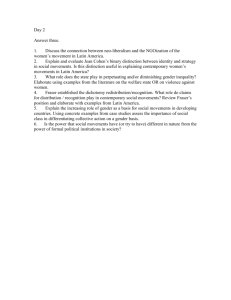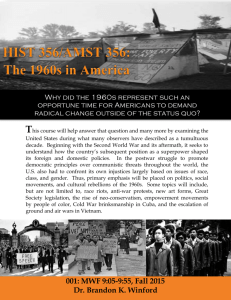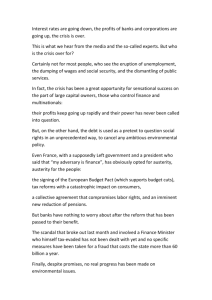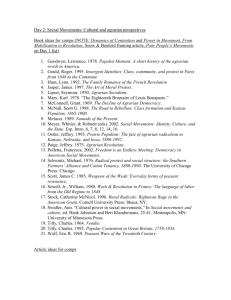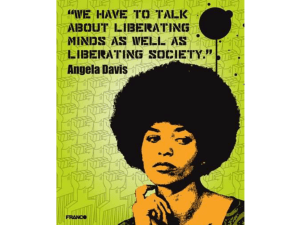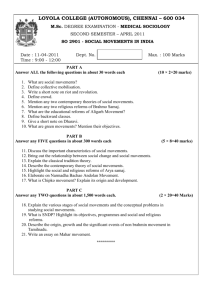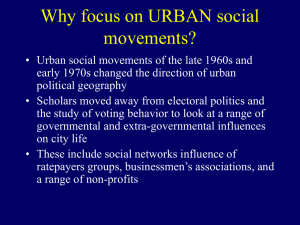Contra-informe (itens) - ESCR-Net
advertisement
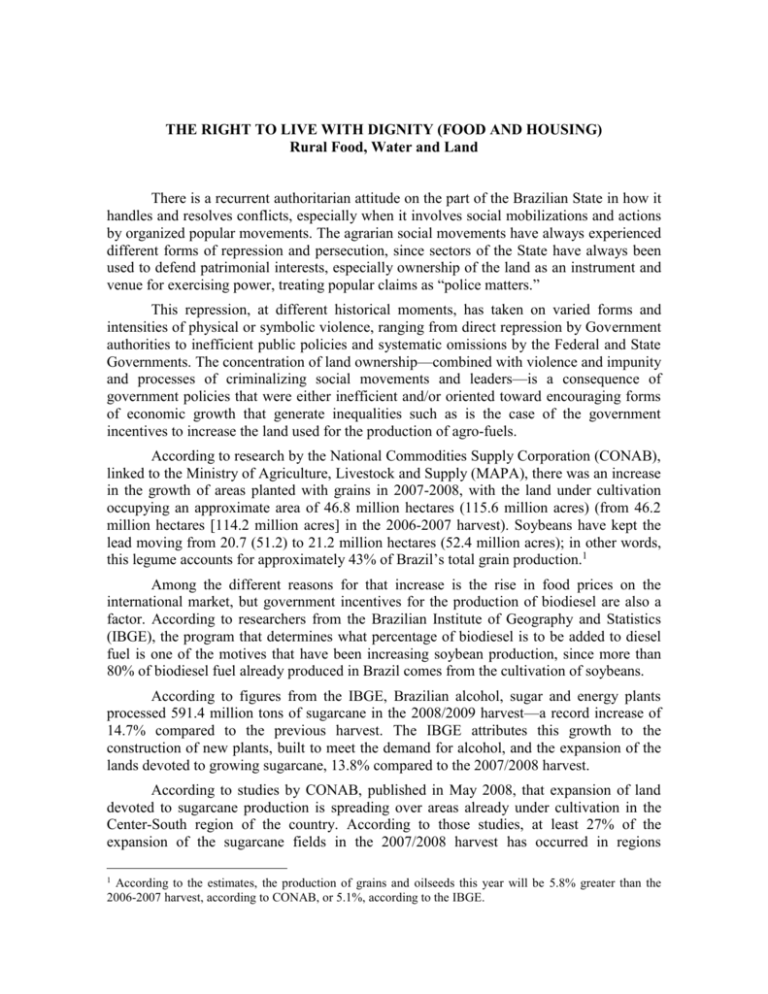
THE RIGHT TO LIVE WITH DIGNITY (FOOD AND HOUSING) Rural Food, Water and Land There is a recurrent authoritarian attitude on the part of the Brazilian State in how it handles and resolves conflicts, especially when it involves social mobilizations and actions by organized popular movements. The agrarian social movements have always experienced different forms of repression and persecution, since sectors of the State have always been used to defend patrimonial interests, especially ownership of the land as an instrument and venue for exercising power, treating popular claims as “police matters.” This repression, at different historical moments, has taken on varied forms and intensities of physical or symbolic violence, ranging from direct repression by Government authorities to inefficient public policies and systematic omissions by the Federal and State Governments. The concentration of land ownership—combined with violence and impunity and processes of criminalizing social movements and leaders—is a consequence of government policies that were either inefficient and/or oriented toward encouraging forms of economic growth that generate inequalities such as is the case of the government incentives to increase the land used for the production of agro-fuels. According to research by the National Commodities Supply Corporation (CONAB), linked to the Ministry of Agriculture, Livestock and Supply (MAPA), there was an increase in the growth of areas planted with grains in 2007-2008, with the land under cultivation occupying an approximate area of 46.8 million hectares (115.6 million acres) (from 46.2 million hectares [114.2 million acres] in the 2006-2007 harvest). Soybeans have kept the lead moving from 20.7 (51.2) to 21.2 million hectares (52.4 million acres); in other words, this legume accounts for approximately 43% of Brazil’s total grain production.1 Among the different reasons for that increase is the rise in food prices on the international market, but government incentives for the production of biodiesel are also a factor. According to researchers from the Brazilian Institute of Geography and Statistics (IBGE), the program that determines what percentage of biodiesel is to be added to diesel fuel is one of the motives that have been increasing soybean production, since more than 80% of biodiesel fuel already produced in Brazil comes from the cultivation of soybeans. According to figures from the IBGE, Brazilian alcohol, sugar and energy plants processed 591.4 million tons of sugarcane in the 2008/2009 harvest—a record increase of 14.7% compared to the previous harvest. The IBGE attributes this growth to the construction of new plants, built to meet the demand for alcohol, and the expansion of the lands devoted to growing sugarcane, 13.8% compared to the 2007/2008 harvest. According to studies by CONAB, published in May 2008, that expansion of land devoted to sugarcane production is spreading over areas already under cultivation in the Center-South region of the country. According to those studies, at least 27% of the expansion of the sugarcane fields in the 2007/2008 harvest has occurred in regions 1 According to the estimates, the production of grains and oilseeds this year will be 5.8% greater than the 2006-2007 harvest, according to CONAB, or 5.1%, according to the IBGE. previously occupied by soybean, maize, coffee and orange crops (the rest of the expansion of the fields took place in pasturelands, replacing 423.1 million hectares [1.05 million acres] of pasturelands). It is important to stress that that expansion, of both sugarcane fields and land devoted to grain crops, have been causing an increase in the demand for land (including heavy foreign investments in the purchase of areas), accordingly increasing their prices. This has been aggravating the disputes in the South and Southeast regions, but has also caused a direct impact on agrarian reform policy, since the more expensive lands in those regions “push” the Federal Executive to expropriate areas in Amazonia, causing damage to the forest. That is the logic fueling the current land ownership conflicts, even affecting the indigenous populations and the Quilombola communities. Among the many examples, the dispute (certainly also permeated by political and ideological factors) surrounding the demarcation of the Raposa/Serra do Sol Reservation, in the State of Roraima, can be cited. Thus, the expectations generated by the election of President Lula (2003-2008) have failed to result in significant changes in government policy toward agrarian reform and land rights. That expectation of significant changes, especially in the implementation of an agrarian reform program, was borne out in the increase of settler families, which jumped from approximately 70,000 in 2002 to more than 150,000 settler families throughout the country already by 2003. Still toward the end of the first year of his term in office (2003), President Lula adopted a National Agrarian Reform Plan, or II PNRA, but its implementation left a lot to be desired, since it failed to settle the 400,000 families set as a goal for his first term in office. There are serious differences about the achievement of the goals, but the Ministry of Agrarian Development (MDA) claims that 381,000 families were settled; i.e., 95% of the goal set in II PNRA was achieved. Going beyond the historical dispute between the Federal Executive and the social movements about the implementation of established goals (number of families actually settled), agrarian reform and the historical demands of landless workers were far from being priorities in President Lula’s first term, and the issue receded significantly in his second term (2007-2010), when there was a strong reduction in goals, which are not being implemented. In 2006, both the National Confederation of Agricultural Workers (CONTAG) and the Movement of Landless Rural Workers (MST) challenged the numbers given by the government, claiming that the number of settled families did not exceed 60,000, but the Executive Branch claimed 117,500 family settled in that year.2 The omission and connivance, or even the agricultural policies that encourage the expansion of agribusiness, fuel the land disputes in agricultural areas. Additionally, other mechanisms have arisen to maintain patrimonial interests such as, for example, the criminalization of social movements and their leaders by sectors of the State (Parliament, Judiciary, Public Prosecutor and Tribunal de Contas da União [General Accounting 2 According to a previous assessment (extra-official information of the National Institute of Agrarian Reform), the achievement of the INCRA’s goals will be second-rate in 2008, since only 18,630 families have been settled to date, while 7,068 families have been placed in projects set up on public lands. Office]). Using legal and/or constitutional mechanisms and instruments, those bodies are acting to characterize or define popular actions and land struggles as crimes. Through the use of legal mechanisms, the intent is to make actions and persons seen and judged (by public opinion, by the state agency in charge) as criminal acts or, in other words, acts committed outside the law. The logic is to criminalize popular actions on the basis of the democratic/constitutional benchmark itself, as mechanisms for restricting rights enshrined, at least, in the letter of the Constitution. The legal framework of the democratic state governed by the rule of law (which promises human dignity for all and clear constitutional guarantees of the rights of free movement, association, speech, as well as social rights) is used against the social movements. The repression is being enhanced, since actions are taken with “the severity imposed by the democratic regime,” according to an inaugural address of the former Chief Justice of the Federal Supreme Court. That severity and “democratic imposition” necessarily comprise a “demonstration” that all of the actions of repression are oriented against movements and actions “on the edge of legality,” which are, accordingly, illegal and illegitimate. Following that logic, the Military Police of Rio Grande do Sul devoted an impressive amount of resources and investigative work3 to conclude that the MST and Via Campesina violate the constituted order. The reserved report of the Military Police characterizing them as movements that have ceased engaging in the acts typical of social claims to perform criminal acts, tactically organized as if they were paramilitary operations. Following the same logic, different from actions taken within the Parliament4, the steps implemented by the Parliament have proven to be more proactive, using mechanisms such as, for example, Parliamentary Commissions of Inquiry, Oversight Initiative Bills (Propostas de Fiscalização e Controle), Legislative Decrees (canceling decisions issued by the Executive Branch that met the demands of social groups such as the Quilombolas and indigenous tribes) and petitions for audits by the Tribunal de Contas da União, etc. 5 In addition, broad segments of the Judicial Branch have been responsible for initiatives aimed at criminalizing actions of social movements. Noteworthy, for example, are two decisions by Federal Justice, one in the State of Pará (Marabá) and another in São Paulo, collecting very large sums of money from the leaders to compensate for “damages caused” by mobilizations of the MST. The case occurring in the State of PA involves the mining company VALE, in which the defenders of land rights were sentenced to pay a fine 3 That study resulted in a detailed report (intelligence report no. 1124-100-2007) of the everyday activities of more than 2000 activists and leaders of the State’s social organizations (personal data, place of residence, what each one does on a day-to-day basis, etc.), revealing the level of actions taken by the Military Police in “revealing criminal actions” of those persons. 4 External action has not replaced legislative actions, especially those constituting attempts to further harden the Legislation that criminalizes the land struggle such as, for example, the bill (being analyzed in the Commission of Constitution and Justice of the Chamber of Deputies), which creates a list of the landless and authorizes the rural employers’ organizations to monitor land occupations. 5 From the deputies of Bancada Ruralista alone, members of the Agricultural Commission of the Chamber, there are more than 40 bills whose primary objective is to block or eliminate rights of rural populations such as, for example, to cancel presidential decrees that establish the demarcation of indigenous lands or Quilombola areas, among other things. in the amount of 5.2 million reais because of having carried out a popular demonstration against the company’s actions in the State of Pará (Amazonia). The reasoning behind those decisions is that any activities engaged in by a movement that is not formally or legally chartered can only be illegal activities, therefore it is illegal and is a crime. This criminalization of social movements, including urban groups, is also being done by sectors of the State democratically constituted to defend the interests of the people, as is the case of the Office of the Prosecutor (Ministério Público or “MP”) (which should be protecting people’s rights), or the public interest and assets, as is the case of the Tribunal de Contas da União (TCU) (or General Accounting Office). The really emblematic case of this process of criminalization is the action taken by the Office of the Prosecutor of Rio Grande do Sul (MP/PS) by attacking the fundamental rights of landless families and their leaders in the State, under the argument of protecting legality in rural areas and guaranteeing constitutional rights. On the basis of the investigations conducted by the Military Police, a report submitted and approved by the Council of the Military Police concluded that the MST should be characterized as a “criminal organization” because it engages in “paramilitary activities.” Accordingly, settled families have to forfeit their civic right to vote (the decision by the Military Police was to seize voter registration cards from settlers), schools in settlements are to be closed, etc. The extreme example was extending the National Security Act to cover the actions of the popular social movements. In addition, the investigations by the TCU have been operating as a mechanism to hinder (or, at least, to limit as much as possible) the flow-through of public resources to popular entities (NGOs) and social movements. Any analysis of the investigative procedures of the TCU (for example, comparing the investigation of the flow-through of resources to employers’ organizations and popular organizations) reveals a well-thoughtout action aimed, at any cost, at condemning the use of public resources by popular sectors. 6 That logic operates as a criminalization mechanism (accusation of misappropriation or embezzlement of public resources), but also as a form of pressure on the Federal Executive, thereby preventing funds from being made available and immobilizing many actions and/or movements. According to expressions contained in several documents of the above-mentioned bodies, the objective is to protect the democratic State based on the rule of law; however, the close relationship with the protection of private property is noteworthy. That relationship reduces the constitutional spirit to ownership rights, since, as Deputy Sciarra wrote, the “subversion of the democratic State of law” has as its “target public and private property.” 6 An analysis of the documents shows that the actions by those bodies refer to or are based on actions of others such as, for example, conclusions by Deputy Sciarra (2008, p. 60), which are based on the decision of a judge in Carazinho/RS to apply the National Security Act (Law No. 7170/83) to the leadership of the MST, as well as various suggestions of his report that are intended for the TCU, the Office of the Prosecutor, etc., with the intention of organizing trials and legal actions.


